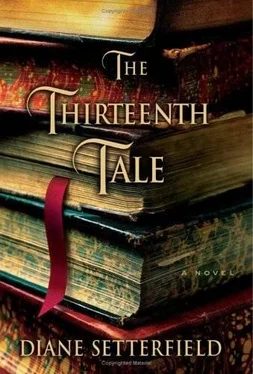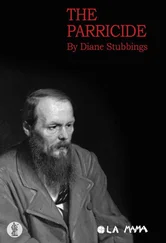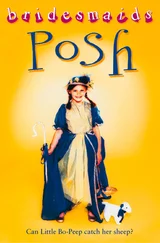Water, like God, moves in mysterious ways. Once inside a house, it obeys the force of gravity indirectly. Inside walls and under floors it finds secret gullies and runways; it seeps and trickles in unexpected directions; surfaces in the most unlikely places. All around the house were cloths to soak up the wet, but no one ever wrung them out; saucepans and bowls were placed here and there to catch drips, but they overflowed before anyone remembered to change them. The constant wetness brought the plaster off the walls and was eating into the mortar. In the attic, there were walls so unsteady that with one hand you could rock them like a loose tooth.
And the twins in all of this?
It was a serious wound that Hester and the doctor had inflicted. Of course things would never be the same again. The twins would always share a scar, and the effects of the separation would never be entirely eradicated. Yet they felt the scar differently. Adeline after all had fallen quickly into a state of fugue once she understood what Hester and the doctor were about. She lost herself almost at the moment she lost her twin and had no recollection of the time passed away from her. As far as she knew, the blackness that had been interposed between losing her twin and finding her again might have been a year or a second. Not that it mattered now. For it was over, and she had come to life again.
For Emmeline, things were different. She had not had the relief of amnesia. She had suffered longer, and she had suffered more. Each second was agony in the first weeks. She was like an amputee in the days before anesthesia, half crazed with pain, astounded that the human body could feel so much and not die of it. But slowly, cell by painful cell, she began to mend. There came a time when it was no longer her whole body that burned with pain but only her heart. And then there came a time when even her heart was able, for a time at least, to feel other emotions besides grief. In short, Emmeline adapted to her twin's absence. She learned how to exist apart.
Yet still they reconnected and were twins again. Though Emmeline was not the same twin as before, and this was something Adeline did not immediately know.
At the beginning there was only the delight of reunion. They were inseparable. Where one went, the other followed. In the topiary gardens they circled around the old trees, playing endless games of now-yousee-me-now-you-don't, a repetition of their recent experience of loss and rediscovery that Adeline never seemed to tire of. For Emmeline, the novelty began gradually to wear off. Some of the old antagonism crept in. Emmeline wanted to go one way, Adeline the other, so they fought. And as before, it was usually Emmeline who gave in. In her new, secret self, she minded this.
Though Emmeline had once been fond of Hester, she didn't miss her now. During the experiment her affection had waned. She knew, after all, that it was Hester who had separated her from her sister. And not only that, but Hester had been so taken up with her reports and her scientific consultations that, perhaps without realizing it, she had neglected Emmeline. During that time, finding herself in unaccustomed solitude, Emmeline had found ways of distracting herself from her sorrow. She discovered amusements and entertainments that she grew to enjoy for their own sake. Games that she did not expect to give up just because her sister was back.
So it was that on the third day after the reunion, Emmeline abandoned the lost-and-found game in the topiary garden and wandered off to the billiards room, where she kept a pack of cards. Lying on her stomach in the middle of the baize table, she began her game. It was a version of solitaire, but the simplest, most childish kind. Emmeline won every time; the game was designed so that she couldn't fail. And every time she was delighted.
Halfway through a game, she tilted her head. She couldn't exactly hear it, but her inner ear, which was tuned constantly to her twin, told her Adeline was calling her. Emmeline ignored it. She was busy. She would see Adeline later. When she had finished her game.
An hour later, when Adeline came storming into the room, eyes screwed tight with rage, there was nothing Emmeline could do to defend herself. Adeline clambered onto the table and, hysterical with fury, launched herself at Emmeline.
Emmeline did not raise a finger to defend herself. Nor did she cry. She made not a sound, neither during the attack nor when it was all over.
When Adeline's rage was spent, she stood for a few minutes watching her sister. Blood was seeping into the green baize. Playing cards were scattered everywhere. Emmeline was curled into a ball, and her shoulders were jerkily rising and falling with her breath.
Adeline turned her back and walked away.
Emmeline remained where she was, on the table, until John came to find her hours later. He took her to the Missus, who washed the blood out of her hair, put a compress on her eye and treated her bruises with witch hazel.
"This wouldn't have happened when Hester was here," she commented. "I do wish I knew when she was coming back." "She won't be coming back," John said, trying to contain his annoyance. He didn't like to see the child like this either.
"But I don't see why she would have gone like that. Without a word. Whatever can have happened? Some emergency, I suppose. With her family…"
John shook his head. He'd heard this a dozen times, this idea the Missus clung to, that Hester would be coming back. The whole village knew she would not come back. The Maudsleys' servant had heard everything. She professed to have seen it, too, and more besides, and by now it was impossible that there was a single adult in the village who did not know for a fact that the plain-faced governess had been carrying on an adulterous affair with the doctor.
It was inevitable that one day rumors of Hester's "behavior" (a village euphemism for misbehavior) should reach the ears of the Missus. At first she was scandalized. She refused to entertain the idea that Hester- her Hester-could have done such a thing. But when she reported angrily to John what was being said, he only confirmed it. He had been at the doctor's that day, he reminded her, collecting the child. He had heard it directly from the housemaid. On the very day it occurred. And besides, why would Hester have left so suddenly, without warning, if something out of the ordinary hadn't occurred?
"Her family," the Missus stammered, "an emergency…"
"Where's the letter, then? She'd have written, wouldn't she, if she meant to come back? She'd have explained. Have you had a letter?" The Missus shook her head. "Well then," finished John, unable to keep the satisfaction from his voice, "she's done something that she didn't ought to, and she won't be coming back. She's gone for good. Take it from me."
The Missus went round and around it in her head. She didn't know what to believe. The world had become a very confusing place.
Only Charlie was unaffected. There were changes, of course. The proper meals that under Hester's regime had been placed outside his door at breakfast, lunch and dinner became occasional sandwiches, a cold chop and a tomato, a bowl of congealed scrambled egg, appearing at unpredictable intervals, whenever the Missus remembered. It didn't make any difference to Charlie. If he felt hungry and it was there, he might eat a mouthful of yesterday's chop, or a dry end of bread, but if it wasn't there he wouldn't, and his hunger didn't bother him. He had a more powerful hunger to worry about. It was the essence of his life and something that Hester, in her arrival and in her departure, had not changed.
Yet change did come for Charlie, though it had nothing to do with Hester.
From time to time a letter would come to the house, and from time to time someone would open it. A few days after John-the-dig's comment about there having been no letter from Hester, the Missus, finding herself in the hall, noticed a small pile of letters gathering dust on the mat under the letter box. She opened them.
Читать дальше












